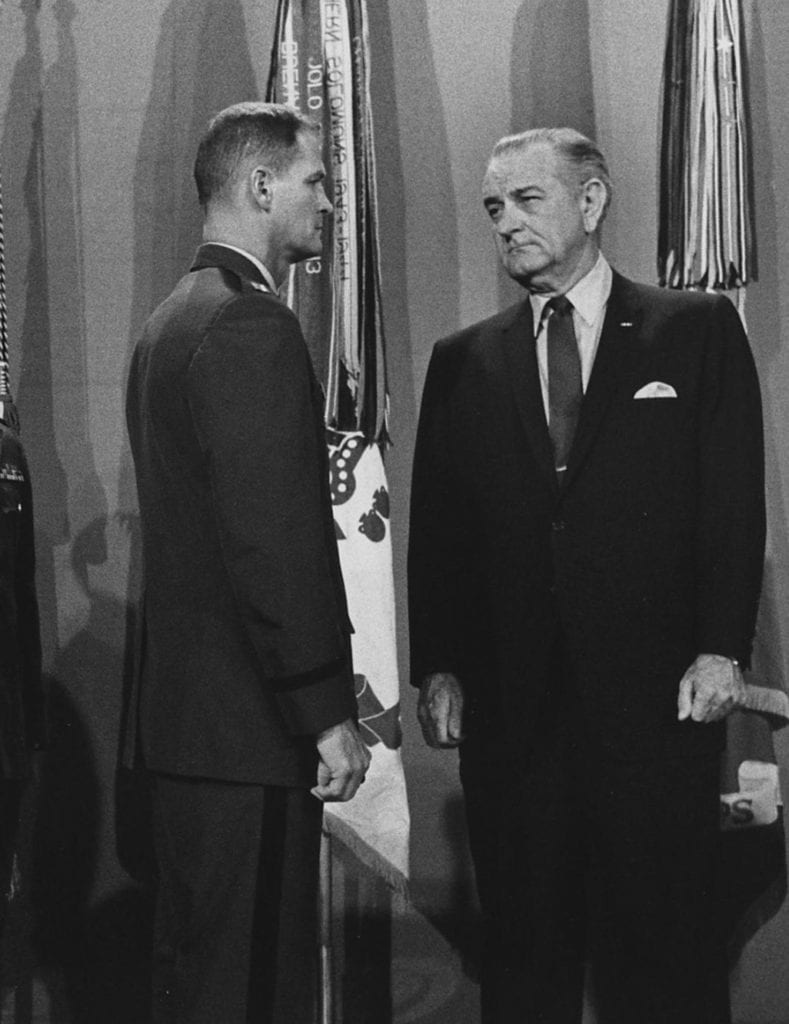
By Dwight Smith
Sunnyside resident Charles Liteky, a decorated war hero, former Catholic priest and later an outspoken and honored peace activist, died on January 20. However, a significant memorial date for Liteky could be September 1 because it was on that date in 1986 that he renounced his medal of honor and the pension that accompanied the medal.
Liteky was born in 1931 in Washington D.C. An all-around athlete in high school, he became a Catholic priest after two years of collegiate sports. He volunteered to be an Army chaplain as the Vietnam war ramped up during the mid-1960’s. At the time the 35-year-old priest didn’t have a problem with the war. He thought it was justified because the North Vietnamese were aggressors against the South.
Liteky wasn’t against using a weapon either, and on the day of the fierce battle that would win him the highest and most prestigious personal military decoration awarded to U.S. military service members who distinguished themselves by acts of valor he thought about picking up the gun of a fallen soldier but thought, “this would be a hell of way for a priest to die.”
In 1968, he was awarded the Medal of Honor by President Johnson because he had risked his life to save the lives of nine members of his platoon in the midst of a fierce battle with bullets spraying all around him.
That medal would loom large in Liteky’s story because twenty years later he wrote a letter to President Reagan stating his reasons for renouncing the medal, which he left at the Vietnam Memorial wall, the monument that lists the names of the 58,000 dead soldiers on it not far from the Capitol and White House.
Over the years Liteky had become a fierce advocate against war, starting with his unease with the Vietnam war as it was winding down in the early 1970’s. He had been urged by a Columbia professor of sociology to question the “assumptions of his subculture” even as he was giving a talk in the class to defend the war to the students. That challenge bothered him and he began to question his assumptions about war.
In the time between the winning and the renunciation of the medal, he left the priesthood, moved to San Francisco and married a former nun, Judy Balach, in 1986. She was involved through her church in a fledgling sanctuary movement for people fleeing the atrocities in Central America.
Having a strong sense of justice and curiosity, Liteky visited El Salvador with a delegation of peace activists to see the situation for himself. Before and after this trip he researched the history of the region and the current conflict and was horrified at what he found.
The U.S. government at the time was supporting and implementing a brutal policy which was resulting in torture, kidnapping, murder of innocent peasant farmers, students and others including priests who were working in these villages. Sickened by this policy, Liteky came to the decision that one way of protesting the policy was to renounce his Medal of Honor.
According to the New York Times, Liteky was the only one of the award’s almost 3,500 recipients since the Civil War to return it in a demonstration of political dissent.
By this time, he was a member of a group called Vietnam Veterans Against The War. These friends decided to engage in high profile activism against the policy in Central America. He and four other veterans began a 47-day hunger strike on the steps the steps of U.S Capitol on September 1, 1986. They subsisted on only water for 47 days until one of them nearly died and they ended their fast.
“We were a group of friends that held the same values” David Hartsough said of his friend Charlie and other peace activists, who (including other war veterans) put their lives on the line to protest war. On September 1, 1987, coordinated protests held on both coasts resulted in one near death as a munitions train ran over protesters at the Naval depot in Concord, California.
Liteky continued to engage in activism, participating in a hunger fast that began on September 1, 1990 at the School of The Americas in Fort Benning GA. This school was the training ground for the police and military personnel in Central America and South America. It had been documented as a training site for some who perpetrated atrocities in Latin America.
Liteky decided to engage in this action after he discovered that 19 out of 25 of the Salvadoran military who had killed eight people, including six Jesuit priests and professors at the University in San Salvador on November 16, 1989, were trained at this school. He was sentenced to six months in federal prison in 1990 for protesting at the school, which included squirting blood on portraits there. In 2000 he was sentenced to one year in federal prison for a similar protest.
When he was 72, Liteky travelled to the Iraq just as the war was launched in 2003.
He lived out the last decade of his life partially in Sunnyside, where he walked his little dog around the neighborhood and wrote his memoirs. He died January 20, 2017 on Inauguration Day.
His friend David Hartsough chuckled and said, “It was like he said, ‘That’s it I’m out of here.’”
Liteky’s wife died in 2016 and no immediate family members survived the couple.